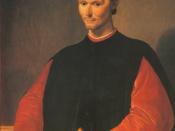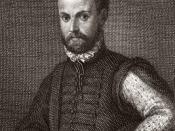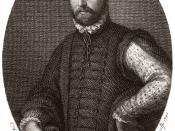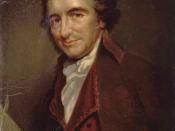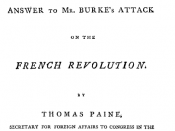Who should have the power in a political state? Does the sovereignty belong to a single monarch or should the people themselves be sovereign? Well, as Americans in today's society this question seems to have an obvious answer. This question didn't seem so simple prior to the American Revolution though. Niccolo Machiavelli and Thomas Paine have distinctively different views concerning sovereignty and people's rights. These views are expressed in Niccolo Machiavelli's The Prince and Thomas Paine's The Rights of Man.
In 1513 Machiavelli wrote The Prince as a handbook to explain how a prince should rule his state. One key concept of this handbook is that the state is more important than the individual. According to Machiavelli, a prince should do whatever it takes to establish a stable society. This means a prince can lie, deceive, and dismiss the church if it will benefit the state. Violence and cruelty can also be an ally if a prince uses them for short periods of time.
Machiavelli did not hold a high opinion of man as an individual. He asserts that every man looks out for only himself.
Paine, on the other hand, was a avid supporter of equal rights. He felt that the individual members of the state should create and operate the government of their state as a group. This meant that the people should have the freedom to debate all questions. In other words, there is no reason for the monarchy to exist. Instead, sovereignty should lie with the people of the state. According to Paine, the state was a product of its people. While Machiavelli felt that the people were a product of the prince and his state.
Machiavelli, and Paine are not just two people with different opinions. These men came from different times. Machiavelli wrote The Prince in 1513 and Paine's The Rights of Man was written 275 years later. During those 275, many changes occurred.
One early change that took place during the Renaissance was the Humanist movement. Humanism brought new ideas never conceived in Europe. These ideas included freedom of will, a more secular interpretation of happiness, and living a more active life. People began to enjoy life, participating and enjoying life day-to-day as opposed to spending life on earth as a mere investment in the afterlife. The Humanist movement promoted the use of critical thinking.
Humanists and their ideas of the use of critical thinking laid the foundation for the Protestant Reformation. Books were more available due to the invention of movable print and cheaper paper, allowing more of society to read the Bible. Critical thinkers coupled with a growing literate population dared to question some of the Catholic practices such as simony, indulgences, and absenteeism. People began to see a difference between what their priests were preaching and practicing and what scripture said in the Bible. By acquiring the courage to question their faith, people began to look at other aspects of their life including their government.
Europe also experienced economic changes over the sixteenth and seventeenth centuries. Exploration and colonization of North and South America brought wealth to European countries. As Europe began to accumulate wealth, a middle class was beginning to emerge. An excellent example of the emerging middle class was the rise of the Bourgeoisie in France. The European countries began to see the development of an educated, powerful, and wealthy middle class.
As the Bourgeoisie numbers and wealth grew an appearance of independent institutions developed. These institutions were free from controlling entities such as the clergy and monarchy. Salons and reading rooms emerged enabling the Bourgeoisie to question what was happening in society even further. This environment away from court, along with the scientific revolution triggered the Enlightenment. A commandment of the Enlightenment was to free oneself from political oppression. These thinkers believed that man was capable of perfecting the good life. Paine, himself was an Enlightenment thinker.
The Humanist movement, the Protestant Reformation, and the emerging middle class contributed to the development of an Enlightened audience willing to embrace Paine's ideas. In The Rights of Man, Paine's revolutionary ideas would have been ill conceived during Machiavelli's time. Similarly, Machiavelli's Middle Ages ideas expressed in The Prince would have experienced the same poor response from Paine's audience 275 years later.
